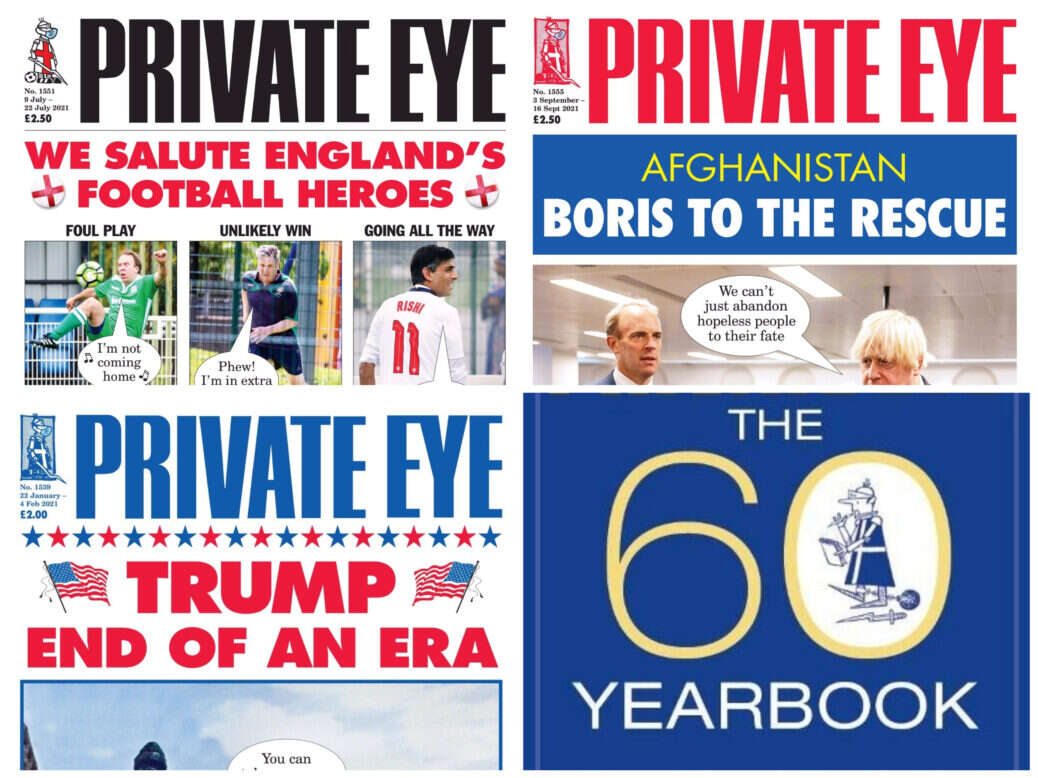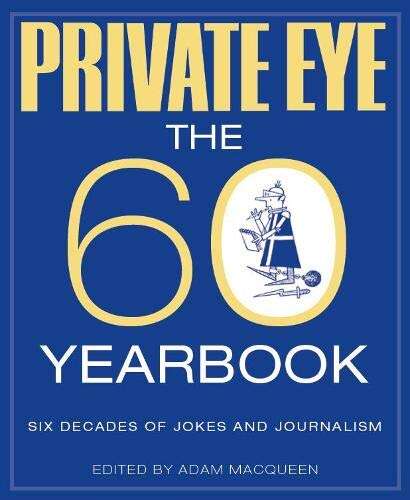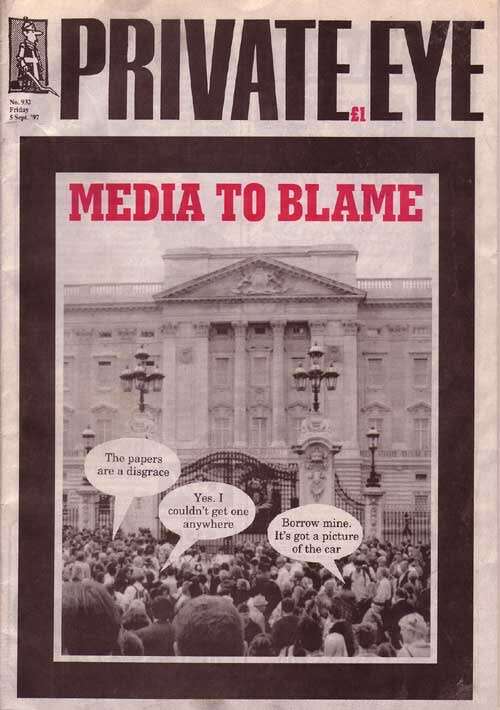
Private Eye is celebrating 60 years in print next month. The secret to its success is apparently simple: its unique formula of jokes and journalism, or “spoofs and scoops” as the Eye team would have it.
Over the decades there’s been a lot of both and self-titled Eye “hack” Adam Macqueen has spent the pandemic scouring back issues to bring the best bits together in new book Private Eye: The 60 Yearbook.
Macqueen, who writes the Eye’s Street of Shame section dishing gossip on Fleet Street, wasn’t even born for the first 14 years of the fortnightly satirical magazine, which launched in October 1961.
While some of the jokes have been obscured by the passing years, “there are some things that just absolutely stand the test of time,” he tells Press Gazette. “It is a joy to go back and read things like Dear Bill and Mrs Wilson’s Diary again, because they are just brilliantly funny”.

The first decade, which saw the arrival of investigative journalist Paul Foot, set the template for the magazine – “two solid slices of journalism sandwiched the jokes in the middle” – which has remained firm with a few aesthetic changes and more pages added over the years.
Since 1986 the Eye has been edited by Ian Hislop, who tells Press Gazette he “inherited a very good template from my predecessors and what I’ve tried to do is just expand it and keep it interesting”.
[Read more: Ian Hislop interview – How Private Eye survived Covid-19 and why the BBC is under threat from ‘vindictive’ government]
The first of the Eye’s now instantly recognisable speech bubble front covers appeared on 12 February 1962, reporting on Prince Charles emergency appendectomy of all things. The idea was actually pinched from a New York magazine that Monty Python’s Terry Gilliam worked on.
Choosing the cover is no laughing matter, says Macqueen, with the Eye’s editors and joke writers examining options like doctors round an X-Ray chart. And with good reason: a strong front cover can put on some 30,000 additional sales for the magazine.
Private Eye began covering the City of London at the very end of the 60s with “Slicker”, aka Michael Gillard. Over the decades it has covered the Jeremy Thorpe scandal, Robert Maxwell, the Thatcher-era, Princess Diana, PFI deals, tax evasion, the Leveson Inquiry and recently Brexit and Covid-19.
On Diana death coverage: ‘They got the mood of about half of the nation right and then the rest of the nation was very disgusted by it…’
Macqueen first joined the Eye on work experience, straight out of university, in September 1997, coincidentally a month after the furore over the magazine’s coverage of the death of Princess Diana, which saw copies pulled off the shelves by outraged newsagents.
“I can remember the postman literally hauling in sacks of letters of people protesting about all of the Princess Diana coverage, and equally big sacks of letters of people saying ‘no, you’ve got it just right, carry on’,” says Macqueen.

Diana’s death on a Sunday – Private Eye goes to press on a Monday – meant the team had only 24 hours to include the “only news story anyone wanted to read about” and try to “gauge the mood” of the nation with an issue that would be on newsstands for a fortnight.
“They got the mood of about half of the nation right and then the rest of the nation was very disgusted by it,” says Macqueen. “There was just a general mood of you can’t say anything bad about Diana.
“It wasn’t an issue slagging off Diana in any way, it was pointing out the hypocrisy of the press in that they’d spent that entire summer… talking about how appalling she was for going out with Dodi Fayed and what a bad example she was setting to her kids… and then suddenly flipping over into this completely reverent ‘she was the most wonderful mother ever, she was a great role model, she did absolutely nothing wrong in her life’.
“But I think the other thing that the Eye did which people found difficult, and on the cover itself, was also to say it’s not just the press that’s hypocritical, it’s the people who are reading the press as well. It’s everyone who was gobbling up all of those papers with paparazzi pictures that they were selling for millions, has actually got some responsibility in the fact that she was being pursued by paparazzi when she died.
“It’s quite a rarity to attack your readers anyway, isn’t it? I think that was something unique that the Eye did at that point, and something I think made people feel quite uncomfortable. I think that had a lot to do with it [being pulled by newsagents].”
Ironically, in common with women’s magazines, sales of Private Eye would go up whenever they put Princess Diana on the cover.
‘It would have been entirely prejudicial had [Rebekah Brooks] been on trial for witchcraft…’
More recently, in October 2013, the Eye faced the threat of having its latest issue pulled from shelves by police during the trial of News International (now News UK) chief executive Rebekah Brooks and former News of the World editor Andy Coulson.
Macqueen attended the first day of the trial at the Old Bailey to find lawyers discussing whether something was in contempt of court or not. “I suddenly realised they were actually talking about the issue of Private Eye, which was out that day,” he says.
this is the Private Eye Rebekah Brooks cover that police reportedly don't want to be sold https://t.co/l7o7WOg9rv pic.twitter.com/AuJIJVTyj2
— Matthew Champion (@matthewchampion) October 29, 2013
The Eye cover showed a photograph of Brooks in her black outfit with white collar along with “Halloween Special” and the headline: “Horror Witch Costume Withdrawn from Shops”, riffing on a news story about Tesco pulling a mental patient costume that had caused offence.
Macqueen admits it “would have been entirely prejudicial had she been on trial for witchcraft, but we don’t really do that in this country anymore”.
He adds: “There was this amazing argument that was just going back and forth between the 20 different lawyers for all the different people in that case over whether or not they could carry on the trial at all or whether it had to be delayed for a fortnight until the jury would definitely not see the cover of this terrible scurrilous magazine whenever they went into the newsagents, or whether there still might be copies hanging around in dentist waiting rooms or something that they might catch sight of months afterwards – absolutely ridiculous.
“And I was just sat there with my pad scribbling all of this down. But because I was in the public gallery you can’t take a phone in at all, so when they finally got to a break I had to go out.
“And it was really like the old days of Fleet Street, I was trying to find a phone box which wasn’t full of tourists taking their photos in it, put 10p in and phone the office going ‘there’s a slight possibility that we might be getting pulled and we might have to pulp the entire magazine’, thinking I would get this terrible reaction back in the office, but all that happened was Ian burst into laughter and thought it was the most hilarious thing ever.”
In the end, the UK Attorney General issued a statement, tweeting that the magazine cover had been brought to its attention, but it had “decided proceedings for a potential contempt of court aren’t required”.
‘Like a dog returning to his own vomit’
All Private Eye regulars are freelance and many have been there for decades. “It’s a weird thing with the Eye it’s either you stay there for life or you get rejected… like a transplant organ,” says Macqueen, who briefly left for a role at the Big Issue before returning in 2002. “Paul Foot, who came back two or three times over the course of his career, always used to talk about being like a dog returning to his own vomit – and that’s what I did.”
Apart from the editor and deputy editor, job titles don’t seem to really exist. “I sign my emails ‘hack’, because that seems to be the most accurate thing,” says Macqueen. Since 1967 and a lawsuit that targeted journalists named in the magazine it has also eschewed bylines. It has meant there has never been a “clashing of egos” at the magazine.
‘I think journalism is much better with fewer opinions in it and with fewer bylines…’
It’s a marked change from the personal brand journalism that has been forged on social media where journalists build their own profiles.
“I think that’s happened because opinion is now the cheapest thing to produce,” muses Macqueen.
“As I keep saying to people who take photos of their favourite stories in Private Eye on the Wednesday when we come out and put them all over Twitter: this stuff’s really expensive. Every story that gets in that there’s probably six or seven that each journalist has looked into that haven’t actually come to anything, but you have to put a lot of resources into checking things out and seeing them through.
“In a lot of cases lawyers get involved, there have been injunctions and things that you ended up spending months and a hell of a lot of money on. And you need the resources to do that stuff. And it is much easier as a lot of publishers [have found out] just to get a load of people who’ve got opinions to come in and spout off about them and with that goes to the picture byline and the personal brand side of things.
“I think journalism is much better with fewer opinions in it and with fewer bylines and personal brands myself. I’m quite proud to say ‘hack’ or reporter as a job title, because someone’s got to be actually out there finding stories and telling people things they don’t know, rather than telling them opinions they already have and agree with in their bubble.”
When it comes to libel actions, The Eye is getting “a hell of a lot less than we used to”. Privacy has become the main source of grievance for those who find themselves in the magazine’s pages.
[Read more: Privacy is biggest threat to press freedom in the UK warns legal editor Mike Dodd as he leaves PA]
‘It’s a great pleasure to be able to be incredibly rude about people and put in horrible nicknames…’
Much of the Eye’s appeal is in its pithy, witty and often trenchant writing style. “It’s easy to get that tone wrong,” says Macqueen, who says freelancers, of which the eye uses many, who try to write in the Eye style rarely get it spot on first time.
“A lot of people try to get in every kind of Eye catchphrase, so they get an ‘Err’ and a ‘That’s enough. Ed.’ and a ‘Contd p94’ and just every possible thing they can get into it and it’s so over the top… I always think less is more with Eye stories. Actually, you just need to give people facts and lead them towards a conclusion, but you don’t need to hammer it home.”
He admits it is “a great pleasure to be able to be incredibly rude about people and put in horrible nicknames and spell Andrew Neil’s name wrong because that annoyed him once in 1980-something – we’re petty so we carry on doing it. You can have a lot of fun with stuff along the way as well.”
Macqueen trips into Eyeisms as he speaks, Piers Morgan becoming Piers Moron without hesitation – although he quickly corrects himself.
Most complained about Private Eye story?
Of all the stories it has done, probably the most complained about was its coverage of the 9/11 attacks on New York in 2001 says Macqueen.
“There was that an awful lot of crossness about that… that was the one time we’ve put in a special cut-out-and-send subscription cancellation form, because we saw that one coming,” he says.
People also still complain about “the piss being taken out of the royals”. One of the more interesting bits of reader feedback came with the issue covering Margaret Thatcher’s funeral in 2013 “when someone sent the cover back having wiped their bottom on it”.
The Eye’s circulation has remained at more than 200,000 over six months since 2002, and since 2016 – the year of a certain referendum – it has been north of 230,000, often spiking with significant political events. It far outsells rival news magazines on a per-issue basis. The pandemic has not dented Eye’s sales, although it did need to fill lost ad space with content.
[Read more: Magazine ABCs: Gardening, cooking and children’s titles see biggest growth]
'You make jokes about what people know and then you tell them things they don't know...'
Hislop has a notion about its continued success: “The obvious answer is the editor is brilliant, but I think that may not be true.
"I think there is just... an appeal about that formula [‘spoofs and scoops’]. And it goes back to you make jokes about what people know and then you tell them things they don't know.
Although he admits jokes and journalism is a “very strange combo”, he adds: “I think it's down to that great media analyst, Mary Poppins, who talked about a spoonful of sugar helping the medicine go down – that might have something to do with it.”
Hislop was 26 when he was named editor of Private Eye, taking over from Richard Ingrams. He's only the title's third editor since its launch, its first editor, Christopher Booker, died in 2019.
“I realise I've been doing the same job for a very long time," he tells Press Gazette. "That is partly because I can't think of any job that's more fun. It may well be that I've been offered no other jobs. It's been terrific. And reading the journalism again... it's just extraordinary
“There is one entirely blanked out page [in the 60 Year book], which we had to redact, which was recounting a Private Eye story from March, 1985, and there's now an ongoing criminal investigation. That's 36 years… it's taken for the police to catch up with the Eye.”
[Read more: Private Eye draws on Blitz spirit after unexploded WW2 bomb threatens print deadline]
'There are stories which we just bang on and on about until someone else takes it seriously...'
“A lot of it is who you’ve got,” says Hislop, who praises deputy editor Francis Wheen, Paul Foot, who died in 2004 and after whom its annual awards are named, Richard Brooks who exposed PFI deals, and Heather Mills who reported on the contaminated blood scandal.
“Some of these stories are just so old, but persistence is the key,” says Hislop.
“There are stories which we just bang on and on about until someone else takes it seriously – something like the Post Office [sub-postmasters scandal]. The great thing you can do with the Eye, because it's wrapped up in jokes and other things, is you can literally just say: 'This is a disgrace, this is a disgrace. Oh by the way, did we mention this disgrace?'
“Then eventually the Post Office story turned into one of the great miscarriages of justice ever in terms of numbers. That is what you can do, which is the ongoing campaign, and then you can just do the one-off story saying: 'You're not going to believe this.' Woof and in it goes.
“There are myriad examples of that over those 35 years.”
He adds: “Looking back on it, the point of this book was not just to say 'would you like to know about who's involved in the Eye and what they do, but it was to say this is how the Eye covered the real world.
"It's a very strange mixture as a magazine, what Adam calls 'spoofs and scoops', and quite often the spoofs get all the coverage. This book is an attempt to say well, hang on, let's have a look at the journalism because that's a huge part of the Eye's appeal.”
Private Eye: The 60 Yearbook, edited by Adam Macqueen, is out now priced £30, published by Private Eye Productions Ltd.
Email pged@pressgazette.co.uk to point out mistakes, provide story tips or send in a letter for publication on our "Letters Page" blog






